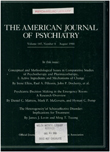Divorce and child custody resolution: conflicting legal and psychological paradigms
Abstract
The resolution of divorce conflict, especially the determination of child custody, is a major social policy concern of both the legal and mental health professions. The differences between the adversarial and mediation legal approaches parallel the phenomenological/psychoanalytic and the family therapy models of the mental health field. A philosophical and practical relationship exists uniting the adversarial and phenomenological/psychoanalytic traditions, while mediation is strongly aligned with family systems theory and therapy. Each paradigm offers American families alternative methods of resolving disputes. A greater synthesis of paradigms is required to give effective help to divorcing couples and their children.
Access content
To read the fulltext, please use one of the options below to sign in or purchase access.- Personal login
- Institutional Login
- Sign in via OpenAthens
- Register for access
-
Please login/register if you wish to pair your device and check access availability.
Not a subscriber?
PsychiatryOnline subscription options offer access to the DSM-5 library, books, journals, CME, and patient resources. This all-in-one virtual library provides psychiatrists and mental health professionals with key resources for diagnosis, treatment, research, and professional development.
Need more help? PsychiatryOnline Customer Service may be reached by emailing [email protected] or by calling 800-368-5777 (in the U.S.) or 703-907-7322 (outside the U.S.).



